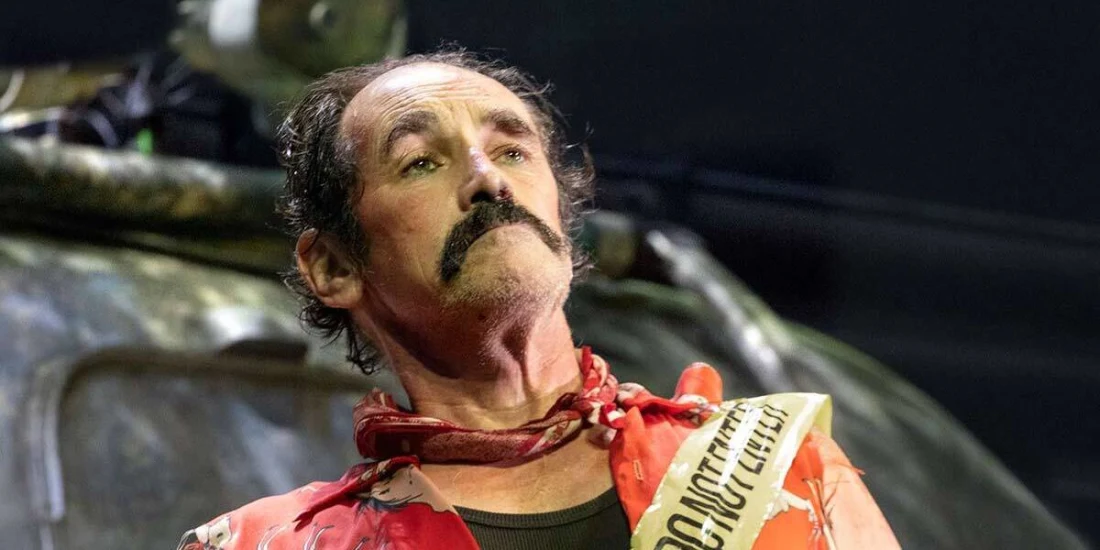'Jerusalem' review — Mark Rylance's titanic performance is one for the ages
Jez Butterworth’s 2009 tragicomedy Jerusalem, starring Mark Rylance as Johnny “Rooster” Byron, has long been heralded as among the greatest plays of the decade, if not century. So, does this feverishly anticipated revival – once again led by Rylance and Mackenzie Crook as sidekick Ginger, and directed by Ian Rickson – cement its place in theatre history? In short: hell yes.
Like all great state-of-the-nation epics, it feels different, but just as potent, in this new context. It can certainly be read as a Brexit play, with Rooster’s group of rural, working-class misfits clinging to a fantasy version of a past England. Davy, who works in the local abattoir, boasts that his ears pop if he even leaves Wiltshire, and sniffs that BBC Points West is now in thrall to Belgium. But it reaches further than one referendum: it’s an empathetic exploration of the outsider, and of our national myth-making.
Most importantly, Rylance’s titanic performance as the gypsy Rooster really is one for the ages. His entrance is spectacular: he bursts out of his Airstream trailer in the woods, tattooed, sunburnt and limping, barrel chest puffed out, and skips into a handstand over the water trough. He then retrieves an egg from his squawking chickens, chucks the shell into the audience, mixes up a hangover cure with milk, vodka and speed, and downs it in one – to rapturous applause.
It immediately establishes Rooster the showman. He used to be a motorcycle daredevil and now has a captive audience of disaffected young people who come to buy drugs, party at his Bacchanalian raves, and hear his outlandish stories. Those tales work their rough magic on us too: the one about his birth to a virgin mother via a stray bullet, or his meeting with the giant who built Stonehenge on the A14, “about half a mile past the Little Chef.”
That mix of the mystical and the mundane, with very specific local references and idioms, is key to Butterworth’s filthily funny and utterly beguiling drama, which all takes place on St George’s Day, as the local town of Flintock holds its annual fair. His characters can wax lyrical about the historic May pastoral revels or powerful ley lines one minute, and in the next laugh over Rooster drunkenly smashing up his TV.
Rylance’s twinkling-eyed host has a rebellious, libertarian spirit, which again chimes with some of our current debates. He despises the new estate built nearby, and is at war with the bureaucracy. Kennet and Avon Council, represented by two po-faced council workers in yellow vests with clipboards, are determined to evict him, but Rooster claims an ancient ownership to this land that runs much deeper than permits and petitions.
Is he a hero or a menace? He claims that these kids would otherwise be in worse danger, hanging out at bus stops or, in the case of the missing Phaedra, left at the mercy of her thuggish stepfather. But I felt far more unease this time around at seeing underage girls getting high with older men, particularly given Rooster’s casually misogynist (and occasionally racist) language. Butterworth’s writing of the female characters is weaker too, and he slots them into confining boxes: the innocent nymph, the pushy tramp and the joyless mum.
Yet, as the mood darkens, Butterworth does interrogate his magnetic protagonist. Rooster’s anarchic behaviour is far less entertaining when he’s neglecting his young son and letting his ex down – or, worse, tempting her with cocaine. He gradually becomes a pathetic figure as we learn that his waifs and strays actually make fun of him, and that he’s been repeating this same pattern with each new generation for decades. Nothing ever changes.
What at first seems like a paean to tradition then curdles into tragic stasis. Everyone is trapped in jobs or lives they hate, including Ginger, unemployed plasterer and wannabe DJ. Crook playing him older is even more effective, since he’s expressing adolescent dreams as a weary grown man. He and Rylance have built up a remarkable dynamic: co-dependency laced with both affection and needling nastiness.
There’s great support also from Gerard Horan as publican and reluctant Morris dancer Wesley, Alan David as the befuddled Professor, and, playing the wistful songbird Phaedra, Eleanor Worthington-Cox (who, when Jerusalem last stormed the West End, was starring as one of the original Matildas).
Ultz’s detailed once again set mixes natural beauty, given a golden hue by Mimi Jordan Smith’s ethereal lighting, with mouldering rubbish. Wild and whimsical, uproarious and desolate, Butterworth’s play is still a mighty force of irrepressible live theatre.
Jerusalem is at the Apollo Theatre to 7 August.
Photo credit: Mark Rylance (Photo by Simon Annand)
Originally published on
